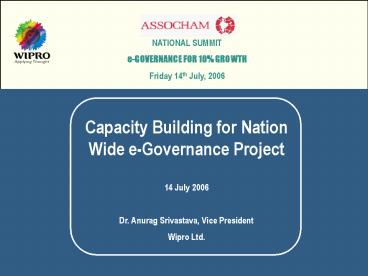Capacity Building for Nation Wide eGovernance Project PowerPoint PPT Presentation
1 / 19
Title: Capacity Building for Nation Wide eGovernance Project
1
ASSOCHAM NATIONAL SUMMIT e-GOVERNANCE FOR 10
GROWTH Friday 14th July, 2006
Capacity Building for Nation Wide e-Governance
Project 14 July 2006 Dr. Anurag Srivastava,
Vice President Wipro Ltd.
2
E-Governance Impacting Growth Rate
e-Governance involves lot of other aspects, apart
from IT.
3
Success Rate of e-Governance Projects
Inspite of numerous experts and people deployed,
the success rate is less than 24!!!!
4
Key Reasons for the Failures
- TECHNICAL AREAS
- Applications being developed do not plan for
interoperability/ scalability- lack of common
standards and frameworks - Core Infrastructure needs to be conceptualized
and developed - Requires focus on having a common infrastructure
for all the departments / synergies
- PROJECT MANAGEMENT ISSUES
- Need for a Project Oriented Approach - following
a time based approach for e-Governance projects - Project Management processes have not been
institutionalised - Lack of Institutionalised project reviews
5
Key Reasons for the Failures
- CHANGE MANAGEMENT / SOFTER ISSUES
- E-Gov perceived as infringement to turf areas
- Most of the employees are working on these
projects apart from other responsibilities - Person dependent initiatives - Change of key
individuals results in loss of all the effort and
initiative taken earlier - Government Process Re-engineering Change
Management - Common standard applications (like HRMS,
e-procurement) which could be used across
departments, are not used
- FINANCIAL AND MANAGERIAL ISSUES
- Funding and financial sustainability of the
projects - Lack of readily available support to the Line
Secretaries for initiating and sustaining
e-Governance projects
6
Capacity Building - Core Factor Impacting the
Success
The Core factor impacting the success is - NOT
ENOUGH CAPACITY BUILDING TO manage the
e-Governance Projects
7
Wipro Capacity Building
- Wipro was engaged to study the existing
e-Governance initiatives, plan for the
e-Governance Roadmap and suggest Capacity
Building measures for various departments in the
following States - Gujarat
- Haryana
- Jammu Kashmir
- Nagaland
- Sikkim
- Tripura
- Manipur
- Orissa
- Tamil Nadu
- Chhatisgarh
- Kerala
- Andaman Nicobar
- Karnataka
- Bihar (WIP)
- Uttaranchal (WIP)
Based on our experience with the above State
Governments, a structured approach for capacity
building is detailed out subsequently.
8
Approach for Identifying Capacity Building
Requirement
The Capacity Building requirement is identified
through the following approach
Enablers
e-Governance Roadmap (eGRM)
- Socio-Economic Assessment
- Development Governance Priorities
- Political vision
- Benefit to citizen
- Economic Benefit
- e-Readiness
- Complexity
- Fund availability
Initiatives at Deptt. Level
Initiatives at Govt. level
Strategy Blueprint
e-Gov Vision
Needs of Govt.
Capacity Building Roadmap (CBRM)
e-Governance Mission Team Composition Structure
Structure Institutional Framework
Detail Project Report (DPR) for Capacity Building
Capacity Building should meet the requirements of
the e-Governance Roadmap .
9
Requirement of Capacity Building Diff. levels
Capacity Building requirement is felt at various
levels. From vision to execution level.. A
robust institutional structure is mandatory to
address the CB needs
10
Proposed Institutional Framework for State Govt.
.. A typical Institutional Structure for Capacity
Building in Central State Govt.to address CB
needs at all the levels
11
State e-Governance Council
- e-Gov Advisory Council to be preferably headed
by the top political leadership and should
provide vision and direction to the initiative - Members of the Council to consist of eminent
people from the industry / region
e-Gov Council to provide leadership and vision
for the e-Governance Plan
12
State Apex Committee
Indicative (State Govt.)
Apex Committee to provide strategy to achieve
policy direction and oversee the e-Governance
program ensure inter - departmental
co-ordination
13
Role of e-Gov Mission Team
- E-Gov Mission Team would do the groundwork for
- Providing an overall
- Direction
- Standardization and
- Consistency
- Resolve all issues pertaining to
- Interdependencies
- Overlaps
- Conflicts
- Standards
- Overarching architecture, Security
- Legal aspects, etc.
- Assist Project Team in accessing external
competencies
E-Gov Mission Team would function as the
secretariat of the Apex Committee
14
Role of Project Team
Assistance from e-Gov Mission Team Envisaged
- Project Development
- Project proposal preparation
- Financial sustainability
- Manage Project Implementation
- BPR
- Software
- Hardware
- Networking
- Quality assurance
- Change management
- Data entry
- Operation Maintenance
Project Team would service the Department
Secretary/HOD (and/or any departmental committee
formed) for carrying out the e-Governance
project.
15
Capacity Building Mix of Govt. Non Govt.
Though there is no rightmix for the Govt. and
non-Govt. personnel in a CB approach, the
objective should be to build a Team of inhouse
experts
16
Composition of e-Gov Mission Team
Indicative (State Govt.)
17
Capacity Building - Elements (Process Tools)
Change Management
Technology
Financial Management
Program Management
- Process
- Information Management
- Information Security Audit Compliance
- SEI CMM
- COBIT
- Tools
- CASE Tools
- Functional Point Analysis
- Process
- Cost Benefit Analysis
- Ratio Analysis
- Budgeting Monitoring
- Costing
- Tools
- Financial Modelling
- PPP Models
- Process
- Risk Management
- Performance Evaluation
- Project Plan Monitoring
- Change Control
- Tools
- Web Based Management Tool
- MIS Templates
- Process
- Issue Resolution
- Conflict Management
- Knowledge Management
- Communication Plan
- Tools
- Benchmarking
- Balanced Scorecard
18
Key Issues that Need to be Debated
- Internal capacity having appropriate skill-sets
and aptitude - Sourcing personnel from the private sector
- Public Private Partnership framework
- Institutional Capacity building framework
- Political bureaucratic commitment
- Training intervention constraints and
facilitating factors
19
Thank you
38

